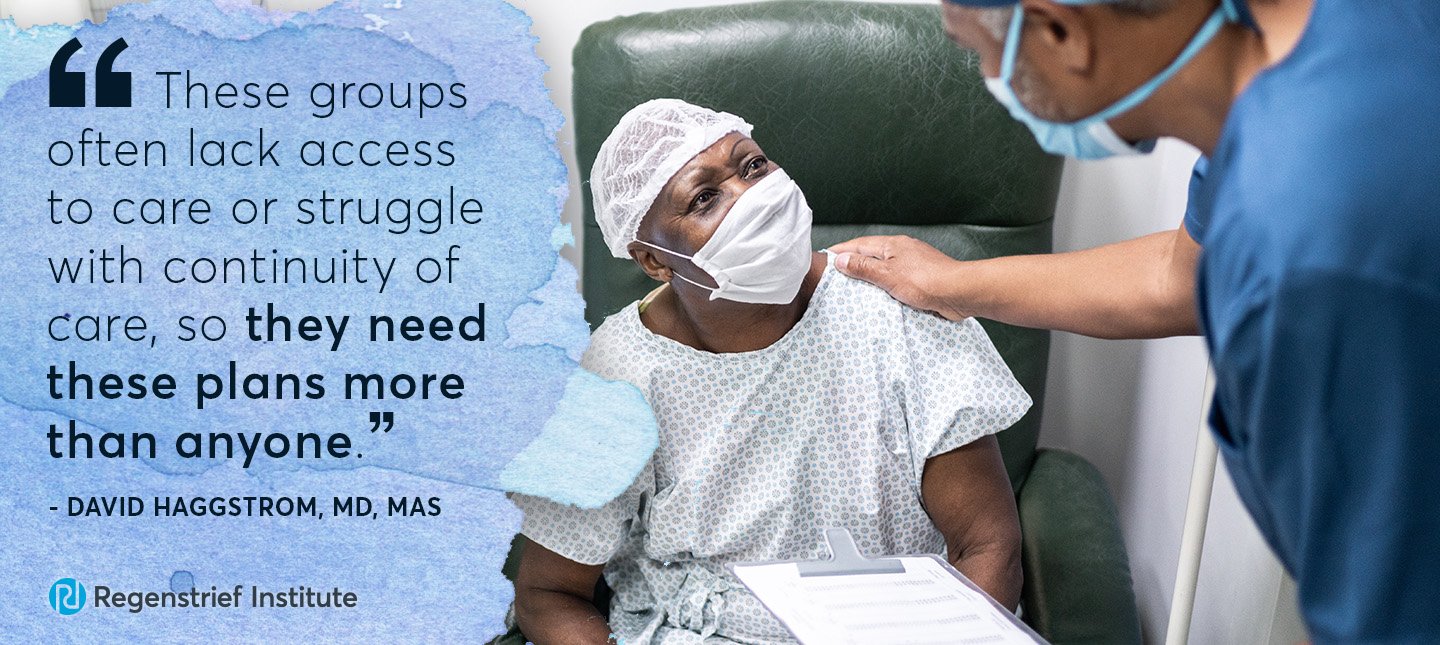Survivorship care plans are an important tool to help cancer survivors transition out of active treatment and back to their regular lives, but a new study found that a number of vulnerable groups are not receiving those plans.
A survivorship care plan is a formal treatment summary that includes information on actions needed to prevent and detect new and recurrent cancer, interventions for long-term effects from cancer and its therapies, and coordination of care between specialists and primary care providers. The American College of Surgeons Commission on Cancer (CoC) does not require but recommends providers deliver these plans.
Researchers from Indiana University School of Medicine, Regenstrief Institute and the Ohio State University analyzed data from the 2016 Behavioral Risk Factor Surveillance System’s (BRFSS) Survivorship modules, which are self-reported measures gathered via telephone survey by the U.S. Centers for Disease Control and Prevention, to determine the role that social determinants of health play in the reception of survivorship care plans.
Data showed that factors associated with a lower chance of receiving a care plan were:
- Low educational achievement.
- Widowed/divorced/separated marital status.
- Being uninsured.
- Being 65 or older.
“These groups often lack access to care or struggle with continuity of care, so they need these plans more than anyone,” said author David Haggstrom, M.D., MAS, director of the Regenstrief Center for Health Services Research, associate professor of medicine at IU School of Medicine and a member of the IU Melvin and Bren Simon Comprehensive Cancer Center. “Healthcare frequently struggles with transitions, so care plans are important to serve as support to the patient as they end active cancer treatment as well as help with coordination of care.”
“The findings of this study highlight the fact that when care plan dissemination is not universal, it can further widen the disparities and clinical outcomes of cancer patients who already face roadblocks to care,” said first author Lava R. Timsina, MPH, PhD, assistant professor of surgery at IU School of Medicine. “Policy initiatives addressing patient education and access to these plans may be necessary to increase their delivery.”
Study authors recommend several steps to reduce barriers to plan delivery and encourage physician participation. They are:
- Including care plans as an accreditation requirement with the CoC.
- Providing insurance reimbursement for creating the plan.
- Standardization of linguistically and culturally appropriate plans.
- Empowering patients to advocate to receive the plans.
- Increasing the use of telehealth to deliver the plans.
The data included patients from nine states and one U.S. territory: Indiana, Idaho, Kansas, Louisiana, Michigan, Missouri, Nebraska, South Dakota, Wisconsin and U.S. Virgin Islands. This is one of the only studies to take a national view of care plan dissemination among diverse populations.
“Dissemination of cancer survivorship care plans: who is being left out?” is published in the August 2021 print issue of Supportive Care in Cancer. In addition to Dr. Haggstrom and Dr. Timsina, authors are Ben Zarzaur, M.D., MPH of University of Wisconsin School of Medicine and Public Health; Peter C. Jenkins, M.D. of IU School of Medicine; and Maryam Lustberg, M.D., MPH, and Samilia Obeng-Gyasi, M.D., MPH, both of The Ohio State University College of Medicine.
About Regenstrief Institute
Founded in 1969 in Indianapolis, the Regenstrief Institute is a local, national and global leader dedicated to a world where better information empowers people to end disease and realize true health. A key research partner to Indiana University, Regenstrief and its research scientists are responsible for a growing number of major healthcare innovations and studies. Examples range from the development of global health information technology standards that enable the use and interoperability of electronic health records to improving patient-physician communications, to creating models of care that inform practice and improve the lives of patients around the globe.
Sam Regenstrief, a nationally successful entrepreneur from Connersville, Indiana, founded the institute with the goal of making healthcare more efficient and accessible for everyone. His vision continues to guide the institute’s research mission.
About IU School of Medicine
IU School of Medicine is the largest medical school in the U.S. and is annually ranked among the top medical schools in the nation by U.S. News & World Report. The school offers high-quality medical education, access to leading medical research and rich campus life in nine Indiana cities, including rural and urban locations consistently recognized for livability.
About David A. Haggstrom, M.D., MAS
In addition to his role as director of the Regenstrief Institute Center for Health Services Research, David A. Haggstrom, M.D., MAS, is a core investigator for the U.S. Department of Veterans Affairs Health Services Research and Development Center for Health Information and Communication, Richard L. Roudebush VA Medical Center. He is also an associate professor of medicine at Indiana University School of Medicine and a member of the Cancer Prevention and Control research program at the Indiana University Melvin and Bren Simon Comprehensive Cancer Center.










